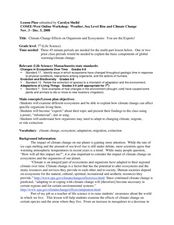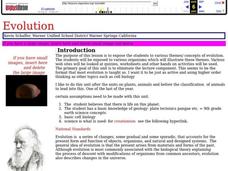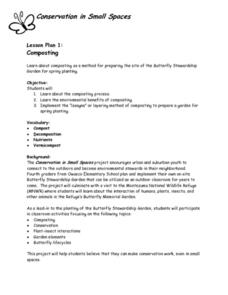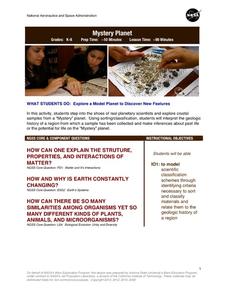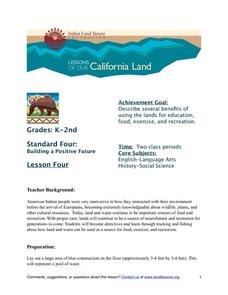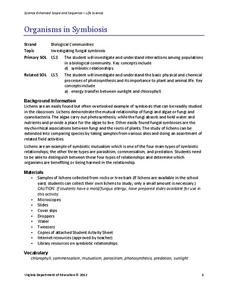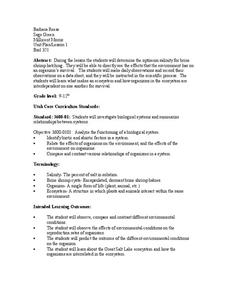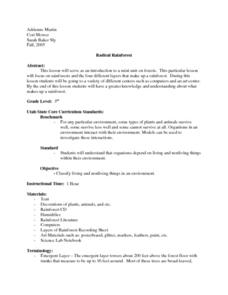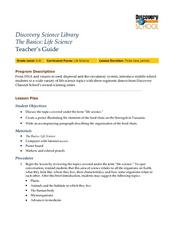Curated OER
Inference By Analogy
Students infer the use or meaning of items recovered from a North Carolina Native American site based on 17th-century European settlers' accounts and illustration.
Curated OER
Pond Water Web
Learners identify the different organisms in the food web. In this biology lesson, students create food chains using the information on cards. They explain what happens if an organism is removed or added in the web.
Curated OER
Climate Change Effects on Organisms and Ecosystems: You are the Experts!
Seventh graders research about the effect of climate on different ecosystems. In this life science lesson, 7th graders present their research by creating a poster, infomercial, skit or song. They discuss how organisms adapt to climate...
University of Minnesota
Mirroring Emotions
Do you ever give your class the "teacher look"? Without saying a word, they become silent and engaged (hopefully). How do they know what you're thinking? Explore the concept of nonverbal communication and how it relates to our mirror...
Curated OER
Earth: Our Big Blue Marble
Students investigate Earth and its resources. In this Earth, space, and nature lesson plan, students collaborate to design presentations on the Earth, its cycles, and how humans have impacted the planet. Images, diagrams, and background...
Curated OER
Evolution
Explore the concept of evolution and cell biology; your class can work in groups to use the internet to view websites on evolution, take a quiz, and complete a lab activity.
Curated OER
Conservation in Small Places - Composting
A fabulous instructional activity introduces the art of composting to your gardeners. In it, youngsters learn about the composting process and how it actually works. They discuss the environmental benefits of composting, and use the...
NASA
Mystery Planet
What can one learn about a planet based on a small surface sample? Learners will explore artifacts from a mystery planet and see what they can determine about the planet based on the evidence in front of them.
Wildwood Trust
Habitats
The circle of life is all around us, from the black bears in the nearby mountains to the pile of dead leaves in the backyard. Encourage young scientists to take a critical look at the world around them with a set of lessons about natural...
Curated OER
Water Uses and Children's Lives in East Africa
Students explore water usage around the world. In this "water" social studies lesson, students brainstorm ways in which water is used. Students visit the Water in Africa website to view pictures of water usage in Africa. Students...
GiggleUp Kids
Happy Little Farmer
Pre-readers and primaries can help farmer rabbit to plant some delicious fruits and vegetables. From soil preparation and pest control, all the way to the harvest, little ones participate in the entire process!
Indian Land Tenure Foundation
Gifts from Land and Water
With a series of fun hands-on simulations, young children can learn about conservation and natural resources. Your learners become land detectives, discussing and investigating the gifts that the land and water provide them. They then...
Poetry Class
Tackling Climate Change
Get your kids thinking about climate change with a series of activities that include creating a ditty box poem for the planet, a poem that identifies concepts or objects they would want to preserve.
Virginia Department of Education
Organisms in Symbiosis
Searching for an activity that allows emerging biologists to explore symbiosis up close and personal? Pupils collect samples and view lichens through a microscope and conclude with a discussion about the relationship they have with other...
Howard Hughes Medical Institute
Viral Lysis and Budding
How do some viruses spread so quickly, and why do they make us feel terrible? Answer these (and many more) questions through a simple yet impactful lessons. Pupils observe demonstrations that show the two methods viruses use to escape...
Curated OER
Hatching Brine Shrimp
Third graders investigate the environment that is considered favorable for brine shrimp hatching. The salinity level is of particular interest in the observations because the optimum level is needed for survival. They make daily...
Curated OER
Environmental Conditions: Friend or Foe
Students research and answer questions on how organisms are classified and how their needs are met through their environment. They work in small groups and create a poster, chart, rap, PowerPoint, or brochure demonstrating how organisms...
Curated OER
Pond Ecosystem Field Trip
Students investigate the environment by participating in a class trip. In this pond ecosystem lesson, students define a list of vocabulary terms associated with ponds such as invertebrate and metamorphosis. Students attend a field trip...
Curated OER
Dinnertime On The Reef
Students identify the main parts of a coral reef. They describe a coral reef food chain.
Curated OER
Radical Rainforest
Third graders examine rainforests and the four different layers that make up a rainforest. They create an advertisement poster advertising a trip to the rainforest, including information concerning why people should visit, as well as,...
Curated OER
Cell-ebrations in Science
Students recognize that all living things are made up of cell and that they cannot easily be seen by the naked eye. Students become familiar with the use of microscopes as a tool for investigation.
Curated OER
The Basics: Life Science
Students develop an understanding of the different fields of study that are encompassed by the term, life science. They view and discuss a video on the topic. In small groups they focus on on of the examples shown in the video to create...
Curated OER
Oh Panther
Learners play a game that replicates the balance of prey and predators in an ecosystem. In this physical education lesson plan, students follow the instructions to play "Oh Panther!" Learners collect data regarding the game and discuss...
Curated OER
Beaver Ecology
Learners explore the lives of bgeahvers. They identify the physical and behavioral adaptations that help beavers survive in their environment. Students compare and contrast how beavers influence the ecology of both forest and aquatic...




